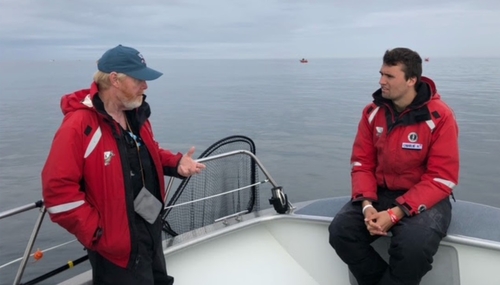 The journalists on CBS This Morning, Monday, offered a surprising look at how Watergate differed with the current impeachment push. Major Garrett and analyst Jonathan Turley warned that Democrats could “lose” the impeachment battle with such “limited” evidence.
The journalists on CBS This Morning, Monday, offered a surprising look at how Watergate differed with the current impeachment push. Major Garrett and analyst Jonathan Turley warned that Democrats could “lose” the impeachment battle with such “limited” evidence.
As he played footage of Walter Cronkite in 1974, Garrett contrasted, “President Trump's attorneys have had very little access to evidence or the witnesses. It has been conducted, this investigation, largely in secret.” Turley piled on the Democrats: “The greatest difference is that there has been very little evidentiary work that has been done. You know, the Democrats are going from zero to 60 in about 100 feet.”
Something you don’t see too often in network coverage of the impeachment push. Turley marveled that the Democrats were actually going through with this:
It appears they're going to go forward largely on this phone call and the Ukrainian controversy. If they do that, it will be the narrowest impeachment in history, and they'll have one of the most limited evidentiary records in history.
 It seems as though Turley influenced Garrett who opined:
It seems as though Turley influenced Garrett who opined:
Speed matters. If you move too quickly and the public cannot catch up with the facts you're presenting, you lose. At least you lose in terms of public opinion being moved by the evidence you present the public. Also, Democrats have a high standard to meet here. Impeachment is not “I dislike the President.”
If saying that Democrats could “lose” impeachment wasn’t warning enough, Garrett reiterated to Democrats: “The evidence has to be presented. The public has to see it and evaluate it before you can move. Democrats at this pace seem to be moving that process much more rapidly than at least previous impeachments have.”
The use of Cronkite on CBS This Morning is becoming common place. On October 11, John Dickerson “You know, during Nixon you had three networks.... But you had a sort of common set of facts. Now everybody can go to their corners. On November 4, Dickerson again cited the old days of only three networks. He worried that now people are “going to their preferred media outlets seeking affirmation rather than information.”
A transcript is below. Click "expand" to read more.
CBS This Morning
11/11/19
8:04TONY DOKOUPIL: Let’s get back to Capitol Hill where the impeachment inquiry against President Trump enters a dramatic new phase this week with the first public hearings. It's the third time in modern history a president has faced impeachment. This morning, we're looking at what led to the resignation of President Nixon in 1974 over the Watergate scandal. He was accused of abusing his office, just as President Trump has been accused. Chief Washington correspondent major Garrett is at the white house. Major, good morning. So how is this investigation different?
MAJOR GARRETT: Well, there's so many differences in our country, in the way institutions are viewed, the way the media is viewed, Congress, the presidency itself. All those things are different. But let's go to the investigation itself, Tony. The Nixon investigation played out slowly, largely at the end in public view, and the President's attorneys were able to mount a defense, though the defense wilted against the available evidence. President Trump's attorneys have had very little access to evidence or the witnesses. It has been conducted, this investigation, largely in secret. Another big difference in the end because political support collapsed, President Nixon resigned before the House passed a single article of impeachment, it's quite clear Mr. Trump will not.
ANNOUNCER: Here is Walter Cronkite in Washington —
GARRETT: Shortly before president Nixon resigned, Walter Cronkite said all of Washington anticipated the final act of the Watergate drama.
WALTER CRONKITE: He is quitting. The ultimate victim of the Watergate scandal that destroyed his administration.
DOKOUPIL: In the face of impeachment pressure now, President Trump sounds defiant and unmoveable.
DONALD TRUMP: They want to impeach me because it's the only way they're going to win. They've got nothing.
GARRETT: The Watergate investigation began in the senate with Democrat Sam Ervin pleading for White House cooperation.
SAM ERVIN: We stand ready to discuss the matter with you at your convenience.
GARRETT: Today's investigation has House members passing by microphones, offering partisan play-by-play.
REP. ADAM SCHIFF: Things have just gone from very, very bad to much, much worse.
REP. JIM JORDAN: This ridiculous charade that the Democrats are putting him through, you can understand why the President's frustrated.
GARRETT: When Nixon's impeachment got to the House, more than 400 lawmakers, a bipartisan landslide, voted to authorize the inquiry.
REP. PETER RODINO: To investigate fully and completely —
GARRETT: Led by New Jersey's Peter Rodino. This time the impeachment inquiry vote was plainly partisan, almost all Democrats in favor, all voting Republicans opposed.
SPEAKER OF THE HOUSE NANCY PELOSI: The resolution is adopted.
GARRETT: Two Nixon prosecutors, Archibald Cox and Leon Jaworksi, led the initial Watergate investigations. Evidence was then submitted to Congress. To slow the probe, Nixon fired Cox creating a debilitating political firestorm. House Democrat Adam Schiff is the lead investigator now. Drawing Mr. Trump's outrage.
DONALD TRUMP: What crooked Schiff is doing, he's a corrupt politician.
GARRETT: Nixon's impeachment focused on a politically motivated burglary, other political espionage and a systemic government cover-up. The story emerged over many months.
TRUMP: Thank you very much.
GARRETT: The current impeachment process, dealing with Ukraine and allegations of dangling military aid for political favors, has moved much faster. CBS News legal analyst Jonathan Turley:
JONATHAN TURLEY: The greatest difference is that there has been very little evidentiary work that has been done. You know, the Democrats are going from zero to 60 in about 100 feet.
GARRETT: Turley also said the range of Ukraine-linked misdeeds against Mr. Trump appears smaller than the allegations that doomed Nixon.
TURLEY: It appears they're going to go forward largely on this phone call and the Ukrainian controversy. If they do that, it will be the narrowest impeachment in history, and they'll have one of the most limited evidentiary records in history.
GARRETT: The Watergate saga unfolded slowly. A CBS News broadcast roughly four months after the 1972 break-in tried to put the key facts in one place.
CRONKITE: We shall try tonight to pull together the threads of this amazing story. Quite unlike any in our modern American history .
DOKOUPIL: Major, there are some intriguing similarities and differences between these two inquiries. If history doesn't repeat itself, at least it rhymes. What are the political implications for the Democrats as they push along with this inquiry at this rate and at this time?
GARRETT: Speed matters. If you move too quickly and the public cannot catch up with the facts you're presenting, you lose. At least you lose in terms of public opinion being moved by the evidence you present the public. Also, Democrats have a high standard to meet here. Impeachment is not “I dislike the President.” It means the President has done something or will continue to do something that's a threat to the administration of the office as we understand it. That's a high bar. The evidence has to be presented. The public has to see it and evaluate it before you can move. Democrats at this pace seem to be moving that process much more rapidly than at least previous impeachments have.




